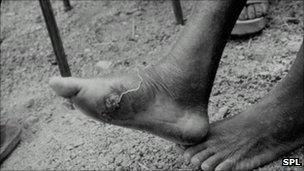Fresh push to rid the world of guinea worm by 2015
- Published

There is no cure or vaccine for guinea worm
The UK government is backing a new campaign to try to rid the world of guinea worm by 2015.
There were almost 2,000 cases of the debilitating parasitic disease in Africa last year.
The push to eradicate guinea worm has been led by The Carter Center - set up by the former US president, Jimmy Carter - since 1986.
The Department for International Development (DfID) is ready to donate £20m to the drive.
It's thought this will fill about a third of the funding gap. Ministers are now calling for other donors to make significant contributions.
Although it doesn't usually kill, guinea worm causes agonising pain and leaves some sufferers bed-ridden after they contract it by drinking contaminated water.
Months after drinking the water, a metre-long spaghetti-like worm emerges from the patient's body through a blister in the skin.
Perpetual cycle
The worm ejects many thousands of larvae if it comes into contact with water - perpetuating a cycle of disease.
There is no cure or vaccine, so the UK aid money will be used by the Carter Center to help train people in tracking outbreaks and using cloths to filter drinking water.
Last year, there were 1,797 cases of guinea worm in South Sudan, Ethiopia, Mali and Chad.
Nigeria, Niger and Ghana have succeeded in recent efforts to wipe out the disease.
When the Carter Center began its work on guinea worm 25 years ago, there were about 3.5m cases in 21 countries in Africa and Asia.
Mr Carter said: "Guinea worm has horrendous consequences for sufferers in terms of their immediate health, and their education and employment.
"It prevents people from escaping poverty.
"I welcome the challenge laid down by the British government. I call on other donors to match their efforts."
If the campaign succeeds, it will be the first time a disease has been wiped out through education - rather than the use of a vaccine or medicine.
The international development minister, Stephen O'Brien, said: "President Carter's commitment has brought guinea worm to the brink of eradication.
"It has never been a question of if we can rid the world of this ancient disease - but when."